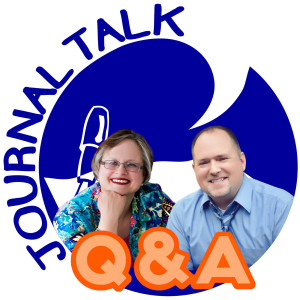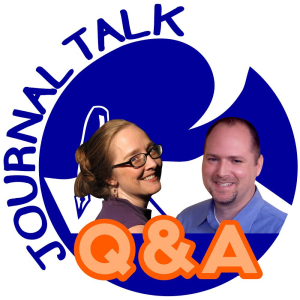Podcast: Play in new window
Subscribe: Apple Podcasts | RSS
 Publishing for a public audience and keeping a private journal are two spheres of a Venn diagram that do, in my opinion, have a very interesting intersection. This episode, long-time JournalTalk listener Nestor asks, “How can journaling help me through the process of publishing my book?”
Publishing for a public audience and keeping a private journal are two spheres of a Venn diagram that do, in my opinion, have a very interesting intersection. This episode, long-time JournalTalk listener Nestor asks, “How can journaling help me through the process of publishing my book?”
Janet Wiszowaty, a Jack Canfield success trainer, joins me in sharing tips and ideas about using a private writing practice to further the publishing process.
I’ve also interviewed several writers on previous episodes of this program, so I offer this list of related conversations which highlight different ways that journal-keeping have helped people succeed in the writing process:
- Journal-Keeping for Fiction Writers, with Danielle Hanna
- Journaling for Transformation (explains how I won the 2014 National Novel Writing Month)
- Can Journaling Make Me a Better Writer?
- Journaling Her Way to Freedom (with the “Writing Whisperer” herself, Shannon Hernandez
- Journaling, and Other Dangerous Pursuits (with Samara O’Shea)
- Travel Journaling, with Lavinia Spalding
- Turning Journals into Memoirs, with Joan Leof
Nestor also mentioned how transcription might help with the authoring process, and I’ve heard people experience great success with Dragon Dictation.
Your turn to answer: Has journaling helped you to complete a novel or other writing project? Does your diary deserve some credit for anything you’ve published? Post your responses at the bottom of this webpage, in the comments section.
You may email your own journaling question to be featured on a future episode of JournalTalk. Or, pick up the telephone and leave a voicemail with your question at 1-805-751-6280. When your question is featured, we will send you a thank-you gift for sharing your voice! (JournalTalk Q&A, Episode #36, January 5, 2016)
To Subscribe to JournalTalk:
Get emails summaries delivered: Click here.
Apple/iPhone/iTunes: Click here.
Google/Feedburner: Click here.
Blubrry site: Click here.
To Listen to JournalTalk: Click on the “play” button > at the top of this article.










